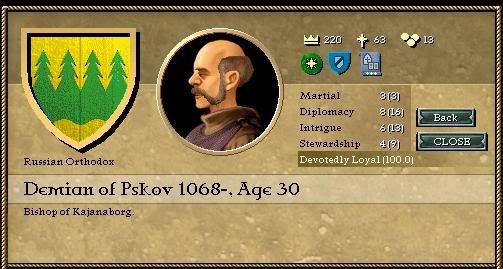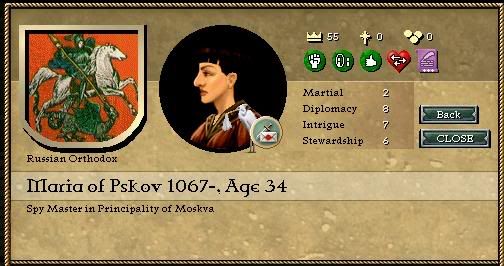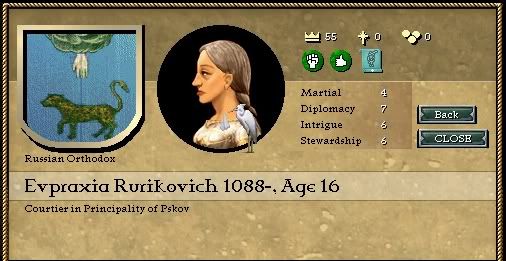The harshness of Vsevolod’s purge left the court both cowed and tamed. His vengeance spent, he to appointed his sister-in-law, Demian’s wife, to the position of Spy Mistress. She was a clever woman and well connected in the court. Her marriage to his brother kept her reliable. It was a good choice. Shortly after her appointment though, she died while giving birth. The former duchess, Domazhir’s second wife Ambrosia, took her place. Her years of blending into the background would serve her stepson well. Around the same time Sophie gave birth to another boy. Vsevolod’s succession seemed secure.
Demian was devastated by the death of his wife. He had loved her deeply and intently. The family from which she had come had lost their lands in wars with pagans, so there was no financial gain that Demian could look forward to. No, his love had been of the purest sort and his grief for his lost wife was as deep and profound as his love had been. Although his grief was great, he knew that he had to remarry. Although he was not eligible to inherit the throne, his sons would be. Besides, a new wife might help him to forget.
Initially, Vsevolod did nothing on the international front. The lands of Pskov were small and relatively poor. The men who could be called up to fight were inadequate for anything other than a limited defense of the homeland. The finances of the realm, though well managed, were low. He focused therefore on diplomacy and secured an alliance with the Principality of Galich.
In the meantime, his brother Simeon died, which was expected, leaving only Vsevolod’s sons and the sons of his sisters as heirs to the throne. The search for a new bride for Demian took two years and many false starts before a Greek woman from Napoli came to court.
Finally Vsevolod had enough men and finances to begin the expansion of the realm and to keep his promise to Demian. War against Savolaks was declared and Kajanborg joined in.
Kajanaborg was quickly subdued, and as a gift, was given to Demian as a bishopric. Vsevolod had kept his promise.
Demian was devastated by the death of his wife. He had loved her deeply and intently. The family from which she had come had lost their lands in wars with pagans, so there was no financial gain that Demian could look forward to. No, his love had been of the purest sort and his grief for his lost wife was as deep and profound as his love had been. Although his grief was great, he knew that he had to remarry. Although he was not eligible to inherit the throne, his sons would be. Besides, a new wife might help him to forget.
Initially, Vsevolod did nothing on the international front. The lands of Pskov were small and relatively poor. The men who could be called up to fight were inadequate for anything other than a limited defense of the homeland. The finances of the realm, though well managed, were low. He focused therefore on diplomacy and secured an alliance with the Principality of Galich.
In the meantime, his brother Simeon died, which was expected, leaving only Vsevolod’s sons and the sons of his sisters as heirs to the throne. The search for a new bride for Demian took two years and many false starts before a Greek woman from Napoli came to court.
Finally Vsevolod had enough men and finances to begin the expansion of the realm and to keep his promise to Demian. War against Savolaks was declared and Kajanborg joined in.
Kajanaborg was quickly subdued, and as a gift, was given to Demian as a bishopric. Vsevolod had kept his promise.





